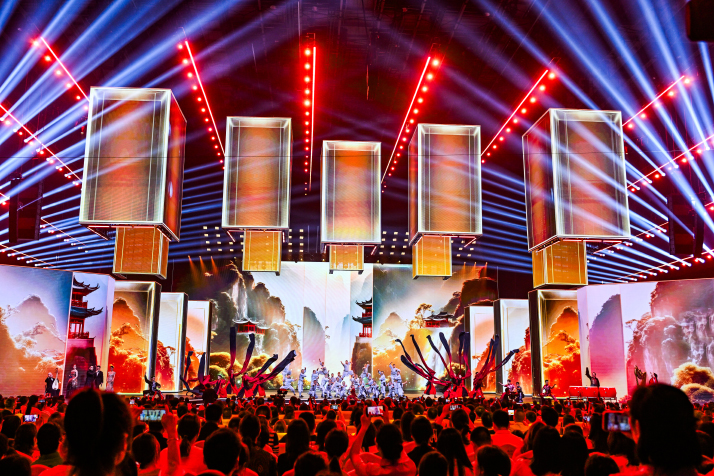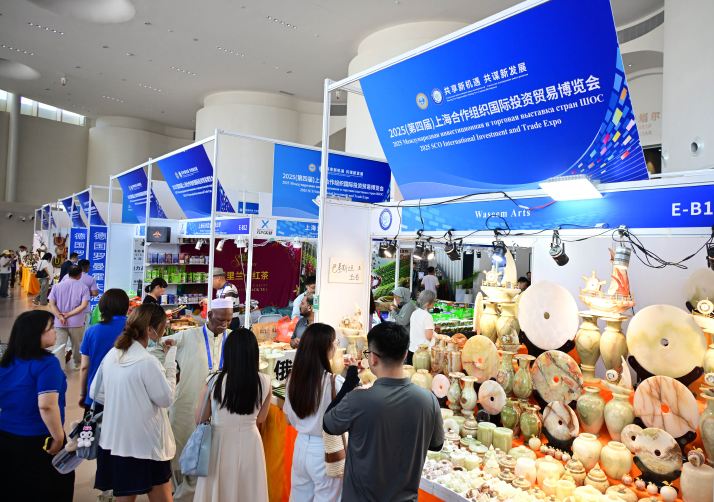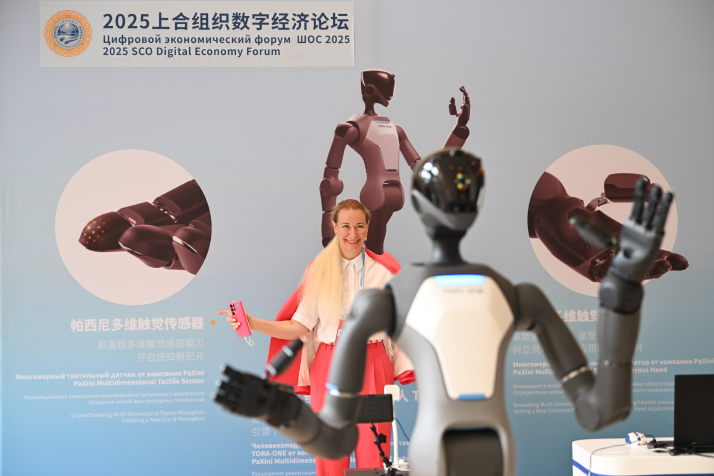| World |
| SCO Tianjin Summit will strengthen both the organization and global governance | |
|
|
 The closing ceremony of the 2025 SCO Film Festival in Chongqing Municipality on July 6 (XINHUA)
From August 31 to September 1, leaders from more than 20 countries and heads of 10 international organizations will gather in the northern Chinese port city of Tianjin for the 25th Meeting of the Council of Heads of State of the Shanghai Cooperation Organization (SCO) and related events. It will be the largest summit in the history of the Eurasian political, economic and security organization since its establishment in 2001. The Council of Heads of State is the supreme SCO body and convenes once a year. The council determines the organization's priorities and defines its major areas of activity, decides upon the fundamental issues of its internal arrangement and functioning and its interaction with other states and international organizations, and discusses the most topical international issues. China will work with all member states to complete the preparations in the final phase for the SCO Tianjin Summit and achieve positive outcomes in areas such as security, development, livelihoods and mechanisms, to hold a friendly and united summit with fruitful results, Foreign Ministry spokesperson Guo Jiakun said at a regular press briefing in Beijing on July 31. The summit will guide the SCO's entry into a new stage of high-quality development featuring more solidarity, coordination, vitality and contribution, and build a closer SCO community with a shared future, he added. An evolving platform In April 1996, the leaders of China, Russia, Kazakhstan, Kyrgyzstan and Tajikistan held a meeting in Shanghai, establishing the Shanghai Five mechanism, and began working on strengthening military trust and reducing forces along their borders. Over five meetings, mutual trust grew, and in 2000, the group decided to transform into a regional cooperative organization. In 2001, the Shanghai Five countries and Uzbekistan together signed the Declaration on the Establishment of the SCO (SCO Declaration). After India and Pakistan joined in June 2017, Iran joined in 2023 and Belarus joined in 2024, the SCO has become the largest regional organization in the world in terms of geographical coverage and population. Currently, it also has two observer states and 14 dialogue partners. Today, as the SCO continues to develop, its functions are also further expanding. "The SCO has been steadfast in safeguarding regional peace and security, ensuring basic stability in the region. It has also continuously strengthened economic, trade and investment cooperation, significantly enhanced levels of trade and investment facilitation, and made initial progress in establishing a transportation and logistics network," Li Ziguo, Director of the Department for European-Central Asian Studies at the China Institute of International Studies, told Beijing Review.  People visit the 2025 SCO International Investment and Trade Expo in Qingdao, Shandong Province, on July 18 (XINHUA)
From security to economy The SCO Declaration was founded on the core principle of joint efforts to address threats that remain pressing today—including terrorism, separatism, extremism, drug trafficking, transnational crime and illegal migration. Under evolving circumstances, new geopolitical factors and technological advancements, the SCO is also adapting its activities to tackle new challenges, such as protectionism, cybersecurity and climate change. With effective multilateral cooperation and coordination, the SCO has been playing a positive role in improving the security situation of the region over the past more than two decades. The SCO has also made remarkable achievements in boosting trade and facilitating economic integration in the region. Take China as an example. In 2024, China's trade with other SCO member states, observer states and dialogue partners reached a record $890 billion, accounting for approximately 14.4 percent of China's total foreign trade. China mainly exports machinery, vehicles, clothing and chemicals while importing oil, gas, agricultural products, coal and ores, according to the Chinese Ministry of Commerce (MOFCOM). Investment and economic-technical cooperation have also steadily advanced. As of June, China's cumulative direct investment in other SCO members exceeded $40 billion. Investments, which initially focused on traditional sectors such as energy, mining, metallurgy, chemicals and infrastructure, are gradually expanding into emerging areas like the digital economy and green development, MOFCOM data show. Moreover, Chinese companies are implementing clean energy projects involving wind, solar and hydro power in those countries, and accelerating cooperation in 5G, Internet technology and smart cities, helping local industries upgrade and transform, the ministry said. In the region, landmark projects, notably the China-Central Asia Gas Pipeline, the Chinese-built new North-South Highway in Kyrgyzstan, the China-Pakistan Economic Corridor, the China-Mongolia-Russia Economic Corridor and the Eurasian transport corridor, have greatly facilitated economic exchange. "The SCO member states are geographically adjacent and economically complementary," Li said, adding that against the backdrop of de-globalization, economic and trade cooperation and investment within the SCO space are accelerating, while the use of local currencies in settlement of trade and financial cooperation is being advanced. "A unified transportation and logistics network is rapidly taking shape, driving faster regional economic integration within the SCO," he added. A China Year This year is the SCO's "China Year." After taking over the SCO rotating chair last July, China has promoted deeper SCO cooperation in politics, security, trade, cultural and people-to-people exchange, and mechanism building, among other fields. For instance, with a focus on the SCO Year of Sustainable Development, China has hosted training programs in fields including green development, poverty reduction, environmental information sharing and green, low-carbon technology. At the Meeting of the Council of the Ministers of Foreign Affairs of the SCO Member States in Tianjin on July 15, the participants highly commended China's outstanding work and positive outcomes as the rotating chair, and expressed their willingness to coordinate and collaborate with China to ensure the success of the Tianjin summit. Currently, the world is entering a period of turbulence and transformation, which presents both risks and significant opportunities for the development of the SCO. Disorder in international relations, the failure of global governance mechanisms and escalating geopolitical confrontations have increased uncertainty and instability. At the July 15 meeting, the participants agreed to enhance cooperation in a variety of fields, promote dialogue among different civilizations, jointly uphold the authority of the United Nations, oppose unilateralism and peacefully resolve flashpoint issues through dialogue and negotiation, to make new contributions to world peace and development. Moreover, with the expansion of the SCO, internal heterogeneity has become more pronounced, and the diversity of interests and demands has increased, making coordination more difficult and impacting the organization's decision-making efficiency and capacity for action. "Facing these challenges, SCO countries unite for mutual support and jointly address a variety of threats and challenges," Li said. SCO Secretary General Nurlan Yermekbayev told China Central Television in a January interview that, during China's tenure as the rotating chair, the SCO is at a critical stage of improving its operations and enhancing quality and efficiency. "All SCO member states are fully supporting China's work as the chair and, as always, are united and cooperative in jointly advancing the organization's objectives," he added. According to Yermekbayev, several important documents will be adopted at the Tianjin summit, including the SCO Development Strategy 2025-35, a document that identifies the organization's main priorities, goals and objectives for the next decade.  A participant operates a humanoid robot at the 2025 SCO Digital Economy Forum in Tianjin on July 11 (XINHUA)
Toward global governance Guided by the Shanghai Spirit—the core value of the SCO, namely mutual trust, mutual benefit, equality, consultation, respect for diversity of civilizations and pursuit of common development, the bloc has been contributing its strength to establishing a fairer and more equitable global governance system. "The SCO has successfully forged a new path of multilateral cooperation and explored a correct approach to interstate relations," Li said. Countries with different political systems, historical traditions, civilizations, religions and economic scales have come together in unity to pursue peace and development. Through harmonious, equal relations among both large and small countries, a new model of state-to-state relations aligned with the trend of history has taken shape, he explained. "Over 80 percent of respondents believe the SCO plays a positive role in global governance, while around 70 percent believe their countries have gained more opportunities to participate in global governance through the SCO framework," according to a survey jointly released by the International News Department of People's Daily and the Global Times Institute on May 23, at the opening ceremony of the 2025 Media Cooperation Forum of the SCO Countries in Urumqi, capital of Xinjiang Uygur Autonomous Region. "The summit is a milestone in the SCO's own development and a turning point in its participation in global governance," Li said, adding that it not only charts a new "golden decade" for the organization but also contributes "SCO strength" to global governance. (Print Edition Title: An Example of True Multilateralism) Copyedited by G.P. Wilson Comments to taoxing@cicgamericas.com Progress and Outcomes China Has Achieved Since July 2024 as SCO Rotating Chair First, cooperation in various sectors has been deepened. China has hosted over 100 events as the SCO chair, and nearly half are institutional events, covering multiple areas such as politics, security, military, economy and trade, investment, energy, education, connectivity, technological innovation, green industry, digital economy and people-to-people exchange. These events helped SCO countries increase solidarity and mutual trust, enhance mutual learning and achieve mutually beneficial results. Second, the mechanisms of the organization have been improved. China has worked with other member states to advance reform and innovation in various aspects such as the deliberation mechanism, cooperation pattern and permanent bodies, so as to ensure smoother and more efficient operation of the organization. Parties are accelerating the consultations regarding the establishment of a comprehensive center for dealing with security threats and challenges, an information security center, a center for fighting transnational organized crime and a counternarcotics center, to strengthen cooperation on law enforcement and security and to build a new paradigm for regional security cooperation. Third, stronger commitment was made to the Shanghai Spirit. The SCO has spoken up to uphold justice on major international and regional issues, firmly upheld the multilateral trading system and strongly condemned the abuse of force, sending a strong message of the SCO upholding peace and justice. China, together with other member states, has actively carried out exchanges and dialogues among political parties, media and think tanks, giving people a better understanding of the Shanghai Spirit and bringing the big family of the SCO closer. (Source: Ministry of Foreign Affairs of China) SCO Quick Facts Member States: Belarus, China, India, Iran, Kazakhstan, Kyrgyzstan, Pakistan, Russia, Tajikistan and Uzbekistan Observer States: Afghanistan and Mongolia Dialogue Partners: Armenia, Azerbaijan, Bahrain, Cambodia, Egypt, Kuwait, the Maldives, Myanmar, Nepal, Qatar, Saudi Arabia, Sri Lanka, Türkiye and the United Arab Emirates Permanent Bodies: SCO Secretariat and SCO Regional Anti-Terrorist Structure Executive Committee (Source: Ministry of Foreign Affairs of China) |
|
||||||||||||||||||||||||||||||
|